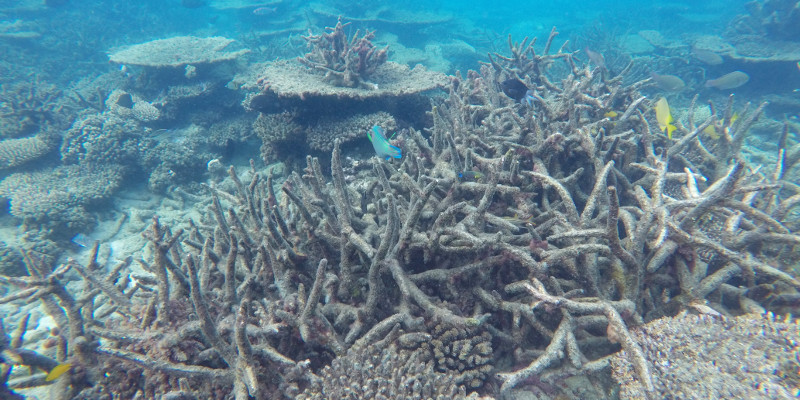Coral bleaching study is most read climate paper of 2017

A paper on the devastating impact of climate change on coral reefs, published in Nature (16 March), tops the most read climate news stories based on journal articles for 2017.
Global warming and recurrent mass bleaching of corals, by Hughes et al, had 46 co-authors, including the Priestley Centre’s Dr Maria Beger and Dr Brigitte Sommer from the University of Leeds. It concludes that “immediate action to curb future warming” is vital to ensure the reefs’ survival.
The league table was constructed by Carbon Brief, based on the Altmetric scores (a combination of mentions in online news and social media platforms) of journal articles. The coral bleaching paper had an Altmetric score of 3166 at the time of the analysis and was covered in almost 400 news stories, as well as receiving over 1800 tweets. It was also the 30th most talked about of all journals published in 2017.
Dr Beger, University Academic Fellow in Marine Conservation Biology, spoke about her role in the research, and the state of coral reefs, to Keeley Donovan on BBC Radio Leeds at the time of publication and has blogged about climate impacts on marine ecosystems following Blue Planet II. She has also hosted a screening of the film Chasing Coral at Leeds, at which she invited marine biologist Dr Mark Eakin (another co-author of paper, who appears in the documentary film) to present and take questions from a packed audience by Skype.
The Carbon Brief league table also gives an “honourable mention” to papers falling just outside the top ten, including, at number 13, a Nature Geoscience paper on pathways to 1.5°C on which Priestley Centre director Piers Forster was a co-author. Emission budgets and pathways consistent with limiting warming to 1.5°C by Millar et al had an Altmetric of 1344, which included 193 news mentions – due in part to some sections of the media choosing to interpret the story as climate models overstating observed warming. These claims were robustly denied by the authors in a guest article for Carbon Brief. The climate news site also fact-checked the claims and concluded that climate models have not “exaggerated” global warming. The controversy also generated a Twitter storm with 841 tweets attributed to it.
